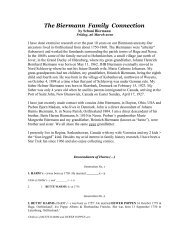A Collection of Dad's Essay's & Writings - Welcome
A Collection of Dad's Essay's & Writings - Welcome
A Collection of Dad's Essay's & Writings - Welcome
You also want an ePaper? Increase the reach of your titles
YUMPU automatically turns print PDFs into web optimized ePapers that Google loves.
only be thwarted by introducing reforms to help the workers. Marxist aims were left in limbo when socialists became<br />
part <strong>of</strong> the parliamentary system and social welfare became the direction governments would take. Revolutionary<br />
Marxists could thrive in the mire <strong>of</strong> discontent and a thriving economy didn't help their cause. It was the mistake <strong>of</strong><br />
the rulers in Russia that led to discontent and an easy path to Bolshevism and the subsequent Communist ideology<br />
that engulfed much <strong>of</strong> Eastern Europe.<br />
It was in Germany and Austria that many reforms took place first and other powers felt it was necessary to copy<br />
the ideas. While the average citizen slaving in most <strong>of</strong> Europe, including the British Isles, were permitted to live in<br />
slummy, filthy buildings and get paid pittances for 60 to 70 hours work a week, the Germans were enterprising<br />
enough to make plans to <strong>of</strong>fer its citizens housing that was livable, neat, clean and with all the conveniences for<br />
comfortable living. It was particularly noticeable that hygiene was a high priority. In town planning, the Germans<br />
were pioneers and without peer, according to one British author. Everything was adjusted to the requirements <strong>of</strong><br />
convenience. It was done with the same efficiency as the designers <strong>of</strong> the chemical and electrical plants. Education<br />
took a high priority too and most could write and read. The schools and universities were second to none. Nowhere in<br />
Europe were literature, music and culture more highly regarded.<br />
Much <strong>of</strong> the misery in Britain during the first six decades <strong>of</strong> the 19th century has been well documented by<br />
several authors, including <strong>of</strong> course, Dickens, who revealed the misery <strong>of</strong> child labor, debtor's prisons and poverty. In<br />
1854, Dickens was moved to write: “They will never save their children from the dreadful and unnatural mortality<br />
now prevalent or save themselves from untimely sickness and death until they have pure water, wholesome air,<br />
efficient drainage and alterations in the building acts.”<br />
In Britain it has been documented that after 1860, that a quarter <strong>of</strong> the men and a third <strong>of</strong> the females were<br />
illiterate. Lessening the hours that children worked in mines would cut down the pr<strong>of</strong>its and many <strong>of</strong> these children<br />
were harnessed like dogs when hauling material and <strong>of</strong>ten whipped to make them work harder; this has been<br />
documented by British historians. The fact that many died was <strong>of</strong> no great concern to factory owners and rich mining<br />
executives, since there were lots more to take their places. Riots by the oppressed were easily put down by use <strong>of</strong><br />
soldiers. Those in the middle classes, with trades and pr<strong>of</strong>essions as well as the squires <strong>of</strong> rural living, had yet to<br />
realize that reform was necessary. In the decades <strong>of</strong> the 19th century this would change quickly when the reforms in<br />
Northern and Mittel Europa were quickly copied and the ages <strong>of</strong> Gladstone's Liberals and Disraeli's Conservatives<br />
implemented changes that led to comfortable living during the later Victorian period and Edwardian times.<br />
Scandinavia, Austria and the Low Countries, as well as Switzerland, eventually implemented reforms. Major changes<br />
included the abolition <strong>of</strong> slavery which was wisely done by the British, Scandinavians and other European lands, long<br />
before it became an issue in the United States in the last half <strong>of</strong> the 19th century. In the British Isles and on the<br />
continent the social legislation would improve living conditions but the singular most important act that would add to<br />
the quality <strong>of</strong> life would be shortening <strong>of</strong> working hours allowing more time for leisure and recreation. The “leisure<br />
ethic” is still more vital to the average European whereas the average American understands the “work ethic” better.<br />
The condition in the major cities in Britain came to national attention during the War in South Africa. In the city<br />
<strong>of</strong> Manchester, 12,000 men <strong>of</strong>fered their services as recruits, but only 1,200 were physically fit for service even though<br />
the army set the lowest standard for acceptance since Waterloo. In other cities it was more devastating and it was time<br />
for action. So this evil was approached from many angles <strong>of</strong> study, including wages, housing, sanitation, medical<br />
service, insurance and education. It immediately set in motion a number <strong>of</strong> acts, such as Insurance, Housing and<br />
Town Planning and immediate progress in improvement in public health and sanitation. All these things are the first<br />
steps in improving the quality <strong>of</strong> life for all citizens. Health Insurance and Age Pensions were among the reforms <strong>of</strong><br />
liberal minds and a liberal government. The ideas formulated in another country were quickly copied and the<br />
Education act did much to push all these things along and lead to a higher standard <strong>of</strong> life. It is interesting to note<br />
that another aspect <strong>of</strong> English life paralleled these improvements and those who could afford it were to flocking to the<br />
country and thereby developed a passionate interest in gardening as well as bicycling, outdoor sports and there were<br />
suddenly a large number <strong>of</strong> walking and climbing clubs. Then there was enthusiasm for spectator sports such as<br />
football and cricket as well as a widening interest in music. One sporting event could draw 100,000 people and a<br />
performance <strong>of</strong> a Dvorak choral work drew more than 10,000. A major diversion for English citizens, rich and poor,<br />
was the excellence <strong>of</strong> the county fairs that had continuity from medieval times to the modern age.<br />
It was Germany that led the way in industrial expansion coupled with systematic social legislation. For Kaiser<br />
Wilhelm II, it was the best way to keep the working class happy and middle classes content. It was Bismarck who<br />
introduced the idea <strong>of</strong> Sickness Insurance Law in 1883 and a year later a measure known as the Accident Insurance<br />
Law was promulgated to be paid entirely by the employers. In 1889, Germany read into law the Old Age and Invalidity<br />
Bill which received contributions from both employer and worker. It eventually was codified to include agricultural<br />
workers and domestic servants. Austria adopted the accident and sickness insurance as early as 1888-89.The sickness<br />
and accident insurance, which was introduced into German life, was one <strong>of</strong> the major social legislations <strong>of</strong> the 19th<br />
century. The German Insurance Acts were landmark ideas and in the last quarter <strong>of</strong> the 19th century something <strong>of</strong> a<br />
revolutionary idea. Whatever one may feel about the political situation in the last 40 years <strong>of</strong> the 19th century in<br />
Germany, it must be admitted that much that was wrong could be laid at the feet <strong>of</strong> Prince Otto von Bismarck. He was<br />
the villain in many events <strong>of</strong> German history and not the three last Kaisers. When a young revolutionary student took<br />
a shot at Bismarck and missed, a Berlin university pr<strong>of</strong>essor would remark loudly on the poor quality <strong>of</strong> the German<br />
revolver.<br />
The many social welfare ideas that originated in Germany and Austria, were eventually accepted in Britain and<br />
many continental lands. But it came about 20 years later and in France and the United States such safeguards for<br />
working people didn't appear until the 1930’s.<br />
It was in 1891 that factory inspections in Germany were becoming more efficient and industrial courts were set<br />
up to regulate wage disputes. But most significantly, weekday employment <strong>of</strong> women and children was closely







